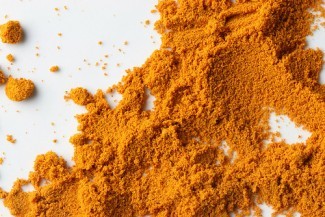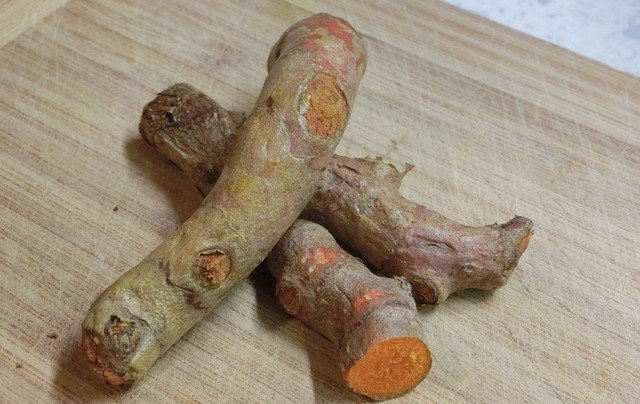Most of us know of turmeric (Curcuma longa) as a powdered spice that is an integral part of Indian cuisine and used in curries as well as in almost every Indian dish.
It has been in use for thousands of years in Asia and according to Indian folk culture, the many health benefits of turmeric make it the most effective nutritional and medicinal herb known to mankind.
Turmeric is a rhizomatous herbaceous perennial plant of the ginger family. Highly branched, the plant grows up to the height of about 1 meter with yellow to orange, cylindrical aromatic rhizomes (underground stems), which are boiled and dried to make turmeric powder as we know it. When available, fresh turmeric roots may also be used, both in culinary setting as well as for its therapeutic value.
Initially, turmeric was used as a dye and later as a key ingredient in Asian dishes and after its therapeutic properties was discovered, as an herbal remedy. Its use as a coloring and flavoring agent, for cosmetic purposes and as a medicinal herb dates back to the Vedic times. In both Indian and Chinese systems of medicine, it is considered one of the most potent anti-inflammatory herbs.
It has a slightly bitter and a peppery flavor with a fragrance that reminds one of ginger and orange. The spice does not have any calories (5gms = 16 calories) and has a very low glycemic index. It is a rich source of manganese, iron, potassium, copper, magnesium, dietary fiber and vitamin B6.
Health Benefits of Turmeric/Curcumin
Modern science has woken up to the therapeutic value and health benefits of turmeric only recently. Turmeric contains curcuminoid, a group of chemical compounds that are natural phenols and produce pronounced yellow color. Curcumin, the principal curcuminoid of turmeric is also its active and primary pharmacological ingredient. The health benefits of curcumin have been studied, established and well documented.
While researchers are not sure of the mechanism of action through which the body is helped by the health benefits of curcumin, they believe that most of its therapeutic value is derived from its anti-inflammatory effect and antioxidant properties. It inhibits a major inflammatory agent known as NF kappa-B. As an antioxidant, it prevents cellular damage by neutralizing free radicals.
 The added advantage of turmeric is that it has been found to be safe in large doses and its active ingredient, curcumin, is effective in very small doses, even in concentrations as low as 0.25 percent.
The added advantage of turmeric is that it has been found to be safe in large doses and its active ingredient, curcumin, is effective in very small doses, even in concentrations as low as 0.25 percent.
This means that the health benefits of the curcumin in tumeric are beneficial even when used as a coloring and flavoring agent in foods like curries and other dishes and the side effects of turmeric, even in large doses, are virtually nil.
Potent Anti-inflammatory
Studies have established that one of the major health benefits of curcumin is it is as good an anti-inflammatory agent, if not better, than drugs such as hydrocortisone and phenylbutazone. While these drugs have serious side effects such as intestinal bleeding, ulcers and decrease in white blood cell count, curcumin is not associated with any toxicity.
Curcumin is safe and well tolerated, due to the lack of side effects of turmeric, and has been proven to be an effective treatment for IBD (inflammatory bowel disease). IBD is a group of inflammatory conditions associated with the colon and small intestine. Crohn’s disease and ulcerative colitis are the most prominent types of IBD.
In an animal study, mice were given an inflammatory agent that normally induces colitis. It was seen that mice given curcumin were well protected. It was also observed that mice given curcumin lost less weight and showed much less signs of colitis such as ulceration and thickened intestinal walls as compared to mice that were not given curcumin.
Rheumatoid Arthritis
As an antioxidant, curcumin combats free radicals, which are primarily high-energy particles, usually an oxygen molecule that has lost an electron. Free radicals travel wildly through the body and damage healthy cells and cell membranes. Free radicals are associated with many diseases including rheumatoid arthritis (RA). Damage cause by free radicals leads to inflammation of joints and joint pains and eventually to joints become dysfunctional.
In a study that compared curcumin with phenylbutazone, curcumin showed comparable efficacy in reducing joint swelling and reduced duration of morning stiffness. It is considered one of the major health benefits of turmeric that it has proven to be an effective treatment for RA because it has a dual anti-inflammatory and antioxidant effect. Taken regularly, turmeric alleviates pain in patients with RA and other conditions that affect joints.
Boosts Immunity and Delays Aging
 Did you know that curcumin is a stronger antioxidant than both vitamins C and E? Curcumin enhances antibody responses that may boost immunity, control cholesterol levels and delay the aging process. These claims are substantiated by a number of studies.
Did you know that curcumin is a stronger antioxidant than both vitamins C and E? Curcumin enhances antibody responses that may boost immunity, control cholesterol levels and delay the aging process. These claims are substantiated by a number of studies.
Researchers at Department of Experimental Therapeutics, University of Texas M. D. Anderson Cancer Center reported that the ability of curcumin to modulate the immune system is the primary reason for beneficial effects of the compound on patients with asthma, atherosclerosis (fatty deposits inside arterial walls), diabetes, heart disease and Alzheimer’s.
Alzheimer’s is a neurodegenerative condition marked by deterioration of cognitive abilities along with behavioral changes and declining activities of daily living. Curcumin decreases formation of beta-amyloid plaques, a waxy translucent complex protein resembling starch that results from degeneration of tissue.
Beta-amyloid plaques are considered to be the major cause for occurrence of Alzheimer’s. Curcumin also delays neuron degradation, which along with its anti-inflammatory and antioxidant effect improves memory in patients with Alzheimer’s.
Prevents Liver Disease
Data from studies conducted on the health benefits of curcumin reveals that it may be an effective treatment of chronic liver diseases.
In a Mexican study on rats, curcumin demonstrated that it effectively prevents acute liver damage. Here again, it is due to its antioxidant action and inhibition of the inflammatory agent, NF kappa-B. It stimulates the production of cytokines, molecules that serve to regulate the immune system, which boost the body’s inherent capacity of fighting disease.
Another study published in Fundamental & Clinical Pharmacology, demonstrated that another one of the health benefits of turmeric is that it may prevent and reverse liver cirrhosis by its ability to reduce expression of TGF-beta.
Diabetes Type 2 Prevention
 A study conducted by Thai researchers and published in Diabetes Care journal reveals people at high risk of developing diabetes could benefit and prevent occurrence of diabetes type 2 by taking turmeric capsules.
A study conducted by Thai researchers and published in Diabetes Care journal reveals people at high risk of developing diabetes could benefit and prevent occurrence of diabetes type 2 by taking turmeric capsules.
The reason was provided by Drew Tortoriello, an endocrinologist and research scientist at the Naomi Berrie Diabetes Center at Columbia University Medical Center. According to him, this is due to the ability of turmeric to reduce insulin resistance.
There is a case here for regular intake of turmeric. This is due to low bioavailability of curcumin, which can be addressed by regular ingestion by way of turmeric capsules or by adding turmeric powder to food.
Cystic fibrosis
Cystic fibrosis is a common congenital disease in which the child’s lungs, intestines and pancreas get clogged with thick mucus due to a defect or mutations in a single gene. In a 2004 study published in the journal Science, curcumin was shown to correct the expression of the gene that causes cystic fibrosis, a fatal disease that affects thousands of Americans.
Additional Health Benefits of Curcumin & Turmeric
Digestive Disorders
Health benefits of turmeric also include its effect on digestion. It is commonly recommended for treating a weak digestive system and constipation. It promotes digestion and is a natural carminative. It can be added to food for relieving gas in the alimentary tract and managing symptoms of colic, flatulence or griping.
According to Ayurveda, its medicinal properties include promotion of discharge of bile from the system and purging it downward. It enhances the excretion of bile via the gallbladder, which aids in digestion of fats.
Turmeric for Skin Health
Turmeric is commonly used as a home remedy for healing small cuts and wounds. Applied topically, its antibacterial and antiviral properties hasten wound healing.
Dry skin, usually caused by excessive use of soaps and exposure to sun and wind, often leads to cracks in the skin. When the cracks begin to itch, it often leads to sores and bleeding.
Also, allergic skin reactions due to allergens in plants, chemicals and food have a similar detrimental effect of the skin. Turmeric creams not only reduce inflammation, redness and itchiness but also keep your skin moist and glowing.
Skin Cancer
While turmeric will not cure skin cancer, it may help in alleviating certain symptoms associated with it. Homemade turmeric paste or commercially prepared turmeric ointment applied topically on the affected area will help relieve itching and stop bad odor caused by the condition.
Applications in Ayurveda – Turmeric with Milk
Bone Health: Turmeric with milk is a standard Ayurvedic prescription for bone health. Consult any Ayurvedic practitioner (in India there is a professional degree for it: BAMS or Bachelor of Ayurvedic Medicine and Sciences) for any bone or joint related problem including fractures and she or he is sure to prescribe turmeric.
Nine times out of ten you will be asked to mix two teaspoons of turmeric powder in a glass of hot milk and drink two glasses twice a day. As we all know milk strengthens bones. When combined with milk, the health benefits of curcumin provide additional benefits. Per se turmeric may not join a broken bone, but its medicinal effect speeds up the healing process.
Turmeric’s ability to reduce pain may help relieve the symptoms of osteoarthritis.
Turmeric Face Masks: Milk and turmeric both have antioxidant properties. Turmeric paste made by mixing a little of milk makes an excellent face mask. It helps repair damage done to skin by free radicals. Leave the mask for an hour and then wash with cold water and you will find your skin glowing.
In fact, applying turmeric mask on the bride as well the bridegroom is an important Hindu ritual during weddings. The idea is that both should look their best throughout the wedding, which often lasts for two to three days.
Turmeric paste can also be used as a cream to reduce localized inflammation caused by acne, eczema, psoriasis and burns. Turmeric mixed with aloe vera makes a soothing paste for treating sunburns.
 Common Cold and Persistent Cough: This is another time tested Ayurvedic application and one of the more welcome health benefits of turmeric. Turmeric milk is a much better and a safer remedy for reducing symptoms of common cold.
Common Cold and Persistent Cough: This is another time tested Ayurvedic application and one of the more welcome health benefits of turmeric. Turmeric milk is a much better and a safer remedy for reducing symptoms of common cold.
Taken regularly, it may even reduce the frequency of occurrence of common cold. A cup of hot turmeric milk three times a day is good for treating a cough that refuses to go away.
Dental problems
Toothpaste containing turmeric is available in the market. A very effective remedy for taking care of dental problems is to mix turmeric powder and salt and make a paste by adding a little of any edible oil, preferably mustard oil. Rub teeth and gums with this paste twice daily for treating bleeding gums and gingivitis.
Precautions
There are no side effects of turmeric when applied on the skin. However, take care while using turmeric powder in face masks and creams because turmeric stains skin and clothes. While skin stains will go away on their own or after washing, turmeric stains on clothes are difficult to remove.
Too much of anything should be avoided. Although turmeric does not have any known side effects, too much of ingestion of any herb is not good. Excessive intake of turmeric may cause nausea or diarrhea.
Turmeric is an anticoagulant. It is advisable that you inform your doctor that you are taking turmeric supplements before any medication is prescribed to you as well as before any surgical procedure is undertaken.
Which Turmeric is Best
You can buy fresh turmeric roots and make turmeric powder at home. This may not be always possible as it may be difficult to find fresh turmeric roots all year along in your part of the world. Ready made turmeric powder is equally good as long as you buy pure, preferably organic, turmeric powder from an authentic source.
There are also turmeric creams, lotions and ointments available in the market. You need to exercise the same caution while buying them; it must be pure without any chemical additives and from an authentic manufacturer and a trusted source.
Efficacy, Safety, and Side Effects of Turmeric
 Turmeric, which until recently was used in Indian kitchens and for its therapeutic value by Indians and Chinese, has now become increasingly popular in the western world.
Turmeric, which until recently was used in Indian kitchens and for its therapeutic value by Indians and Chinese, has now become increasingly popular in the western world.
Modern science has recognized the myriad of health benefits of curcumin and its medicinal properties, a fact which is evident from the patent war that took place a few years ago.
Indians fought tooth and nail and succeeded in keeping turmeric out of the clutches of the big pharmaceutical conglomerates.
There is a valid reason why turmeric is best when taken regularly. The major pharmacological agent in turmeric, curcumin, is not readily bioavailable and the best way of deriving full benefits is to add turmeric powder to food. In the event that is not acceptable to you, you can opt for turmeric supplements easily available over-the-counter as soft gel capsules.
Because the side effects of turmeric are virtually non-existent, turmeric is a highly valuable herb in the treatment and prevention of many health conditions.
As a matter of fact, the most amazing of the many health benefits of turmeric may be that it has such significant curative and preventive value in so many areas of health. Even those who haven’t been diagnosed with any ailment can benefit from its ability to prevent many medical conditions.
Strengthen Your Immune System Naturally
Beta-1, 3D Glucan boosts the immune system to provide support and balance. It is unlike other immune supplements that simply stimulate or alter the immune response in unnatural ways. Over 50 years of research from prestigious universities around the world document the benefits of Beta-1, 3D Glucan.
Transfer Point is the only company that offers a Beta glucan with a minimum of 83% Beta-1,3D Glucan content, with no harmful contaminants. Every batch is independently tested and a Certificate of Analysis is provided and available upon request.
Research proves that purity matters when it comes to biological activity. No other Beta glucan can match the effectiveness that has made Transfer Point’s Beta Glucan the respected name in immune support.
Learn more about Transfer Point Beta Glucan now.
Why do we promote this?


 Fill out the form below to sign up to our free natural health and healing newsletter and stay up to date on our latest articles about holistic healing therapies and effective home remedies for common ailments. As a thank you for joining our newsletter, we’ll also send you
Fill out the form below to sign up to our free natural health and healing newsletter and stay up to date on our latest articles about holistic healing therapies and effective home remedies for common ailments. As a thank you for joining our newsletter, we’ll also send you